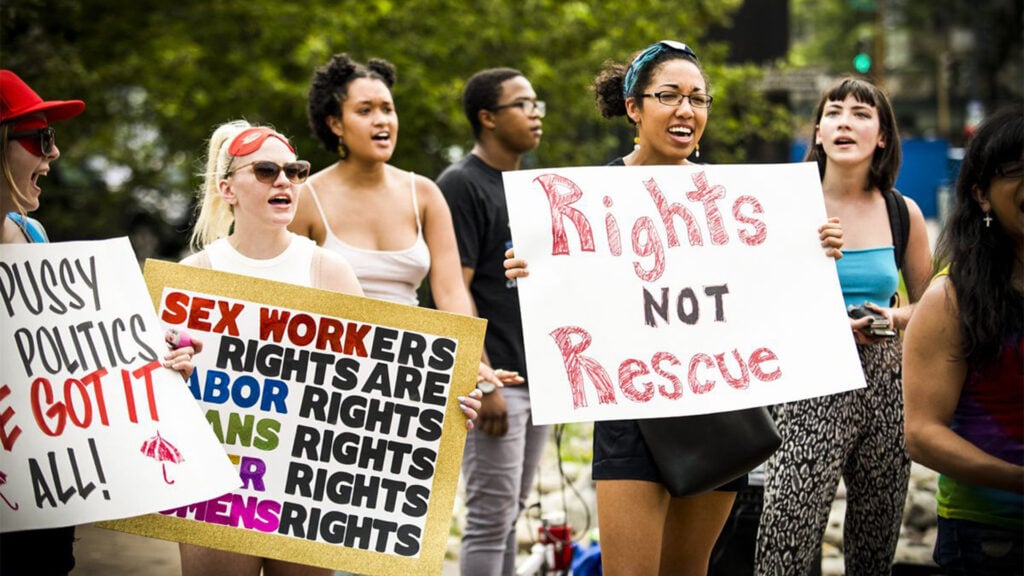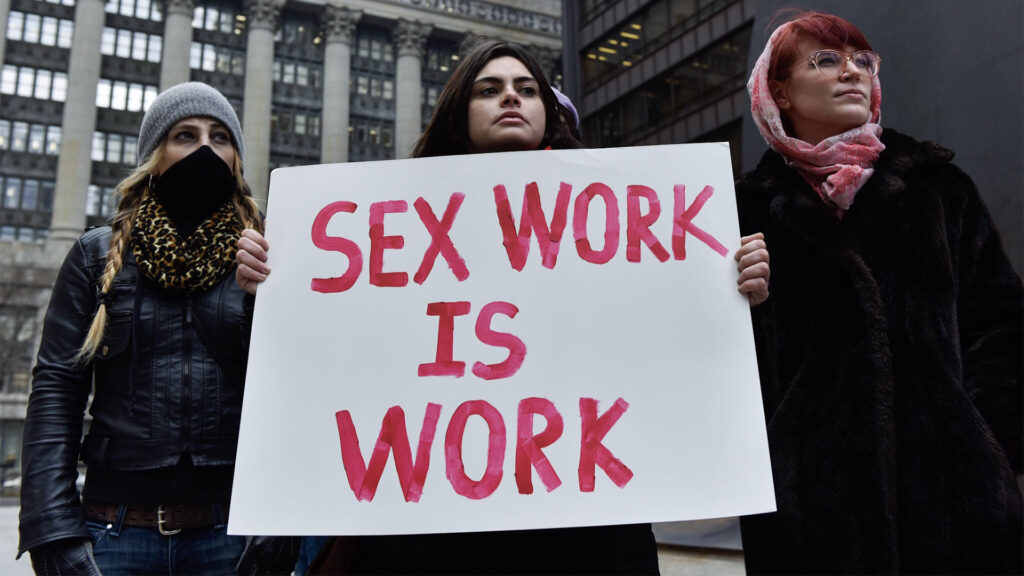
The English language is a mod podged miracle. Every day, we add new phrases and idioms to our world, from fresh slang making its way into the dictionary to words invented between lovers and roommates. As a collective, we’re constantly adjusting our language, bringing words closer to the heart of what we truly mean to say.
Sometimes, those adjustments are fun, like the reinvention of the word “tweet,” or a word like “queef” describing a very specific (and fun) bodily event. Part of it is because English speakers are pretty linguistically lazy. If something is three words or longer, we usually chop it up into a brand new acronym and run with it. Everybody loves the word SNAFU, and haven’t all of us called ourselves a “thot” at one point or another by now?
Not all our new lingo born from acronyms is playful though. Instead, sometimes we create a new word to better sum up a complicated concept or attitude. Rather than rattle off a string of words every time we want to talk about something, we settle for just a single word – like SWERF.
Short for “sex worker exclusionary radical feminist,” this word packs a lot of action into five small letters. Although people who spend less time on the internet or are outside the political sphere may not know this phrase at all, for folks on the inside, this acronym forms a staple of our collective debate about what it means to be a feminist.
If this word is brand new to you, don’t sweat it – not all of us are sex writers who focus on inclusivity for a living. But what all of us as humans are trying to do (I hope), is coexist on this planet in a way that makes us happy while also allowing room for others to find joy. And that’s why I’m here to share with you what the SWERF mentality is all about – so you can understand why it does more harm than good.
If you’re on Instagram or Twitter and follow at least one stripper or person with an Only Fans account, chances are you’ve heard the phrase “SWERF,” or at least seen it in their hashtags or comments section. In a nutshell, a SWERF is someone who believes that “all sex work is inherently oppressive.” All sex work industries, they say, are part of women’s objectification, and therefore all sex work leads back to more violence against women.
The SWERF mentality came as a backlash to “third wave” feminism. Before your head spins with too many new terms, I’ll keep it short: third-wave feminism is all about individual choices, celebrating autonomy, and understanding how the many layers of our identities impact our daily lives.
They believe that all women involved in sex work are exploited, and are upholding standards or beliefs that keep women down. According to them, no sex work can truly be consensual, and everyone who is in the sex work industry is a guilty party involved in continuing cycles of oppression.
Unlike other modern feminist movements, where choice reigns supreme and the future is beautifully queer and diverse, a SWERF sticks to the old take on equality, with rigid rules and set ideas of what a woman should or shouldn’t do – including abolishing all sex work.
“Sex work” is an umbrella term for a variety of services offered that exchange sexuality for money. Just like folks who code, people’s motivations for becoming a sex worker vary. Some get into it for love of the job, while others follow the dollar signs. While there are many kinds of sex work, there are five paths that are more common than others.

A dominatrix explores sadomasochism, domination, and submission with consenting clients in exchange for money. For their clients, this is a healthy way to express their desires safely, free of judgment or consequences in their personal lives. Some dominatrixes engage in penetrative sex, but many do not.
Most careers are going remote these days – and sex work is no exception. Cam models and content creators of all kinds express their sexual selves online in exchange for money. Usually, this is done from the comfort of the model’s own home, and the content offered is a blend of camming, Snapchat, and OnlyFans. Sometimes, content creators even sell their panties and socks as a bonus. Many models make a very comfortable living
Anyone who strips will tell you it’s a lot of work. Every shift is a workout, and since dancers are part of the service industry, they have to juggle their performances with engaging customers on the floor. These hard-working performers aren’t paid hourly and their sole income is on tips – they even have to pay a stage fee at the start of each shift. Still, for sex workers who want a broader client base and more community engagement, it’s a rewarding job. But next time you’re at a club, be sure to slide them an extra twenty. They deserve it.
As our world becomes more digital, the porn industry is evolving fast. Suddenly, everyone with a camera can upload content. For now though, the adult film industry is still alive and kicking. Porn performers may be in it for quick cash in a one-time stint, or they may build an empire out of their career. Whatever they choose, it’s a valid means of earning that bread.
Also called escorting, this is the oldest profession in the book – and one that still somehow is the most vilified. Full service sex workers offer penetrative sex and other sexual favors. While some people seek clients in face-to-face interactions, many escorts now have websites and post their services on discreet online platforms like Tryst.
I want to believe the best of people, and surely, SWERFs don’t all believe they’re being malicious. The thing is, they probably believe they’re doing the right thing. But even a SWERF with her heart in the right place, who thought her work could end oppression once and for all, is part of the problem. You know what they say about good intentions.

SWERFs approach the world like they know what’s best for everyone – no matter what individuals have to say about it. Their take on sex work, even when you paint it in the rosiest light, treats sex workers like children who can’t make adult decisions for themselves. Any sex worker who loves their job is mistaken or lying – and nonbinary, trans*, and male sex workers straight up don’t exist in the SWERF equation.
Instead of seeing sex workers as independent people capable of making grown up decisions, SWERFs reduce them to victims of a system. Instead of flowing with the times, this kind of thinking just shouts back to Victorian ideas of men being filthy monsters with sex drives, and the rest of us being flowers in danger of being trampled by them.
The trouble doesn’t stop there. It’s that this kind of thinking traps us in sexual boxes. They encourage the idea that we should be reserved, gentle, and puritanical in the sack. According to them, a woman could never want sex as a business – we just want it for security and deep intimacy.
Ask anyone writing for or selling panties on this site, and they’ll tell you that just ain’t true. We’re sexual beings – all of us. And while connection and meaning has a place in the bedroom, so does casual sex. Sex positivity, in all forms, reminds us that we’re capable and powerful.
At the core of the anti-sex worker argument is that human trafficking victims don’t have a choice, and sex work contributes to systems of exploiting innocent people. By outlawing sex work, SWERFs say, they’ll stop a chain of violence for good. The thing is, the sex worker community and allies are passionately against trafficking as well. And instead of spouting theories on how to end it, the sex positive platform actually has political and legal plans based on real life experience in sex work to combat trafficking.
Someone who has been forced or coerced into having sex for money or goods isn’t involved in sex work. By definition, sex work is when people enter the trade of their own free will, electing to do it as a career path.
But even if you put that misunderstanding of definitions aside, when you pick apart SWERF arguments about sex work promoting violence, it just doesn’t stack up. If anything, some studies show just the opposite: violence, particularly rape, decreases when full service sex work is readily available.
From 2003 to 2009, Rhode Island had a legal loophole that legalized certain kinds of full service sex work. During that period, “the state’s rape rate declined significantly, especially in urban areas.” Likewise, there were less cases of STI transmission. With stats like those, it’s enough to make you wonder why the law outlawed sex work all over again.
Statistics and autonomy aside, there’s one question that remains: what is so evil about two parties consenting to getting sexual together? Even if there’s money attached to it, this is ultimately still about what two (or more) adults agree to do with each other. Nobody is getting hurt, and people do it all the time without money involved.

Sharing pleasure and giving people pleasure is healthy and normal. When we think of sex work, there’s a common stereotype of all sex workers being desperate and all patrons being creeps. But in reality, interactions with each client or patron is unique, and sex workers all have different feelings about different clients. Some form meaningful bonds or relationships that still have money involved, and others are a one-time interaction that leaves both parties satisfied.
And what’s so wrong with that? Someone is offering a service another person needs. Sex workers are a safe harbor for people who fear rejection, don’t have time to date, or have a burning desire to try something new they’re too timid to voice.
SWERFs, at the root of it, are judging sex workers and clients without actually asking them about it – and if they took a look around, they’d be surprised by what they find. Sex worker isn’t a slog that people feel forced into. Many cam models and dancers and full service escorts are deeply satisfied by their work. Some find that their job gives deep meaning, while others are just having a blast doing it – and some just do it for the paycheck. When the same thing can be said for coding, writing, toy making, or dentistry, why do we judge one branch of work more harshly than all others?
One of the most common SWERF arguments is that it’s wrong to support women’s choices when their choices support something harmful. According to them, women shouldn’t get a hall pass exempting them from judgment. SWERFs feel that contemporary feminism’s big problem is that it calls for us to support women’s choices blindly, without examining the issues that are impacted by those choices.
It’s not a bad point. We should look at each and every action or life choice we make and ask ourselves if we’re doing these things because we want to, or if we’re doing them because society has forced our hand. But we should be thinking about this at every level – and SWERFs only seem to mean it when it comes to sex work. But if we judge someone for stripping because they only did it to make money, why don’t we judge someone who pursues a career in stocks because their parents pressured them to?
Everybody’s relationship to their work is unique, and saying all sex workers are contributing to the destruction of our society is painting a broad, dirty brush. I agree that we shouldn’t blindly celebrate each other’s every action, but we have to see the complete picture first – and sex work contributes far more good than SWERFs ever acknowledge.
It’s no secret that sex sells; it’s something that drives us all, each and every day. Sex workers tap into our societal desires and perform an essential need for their clients. The people who hire sex workers are diverse, and have legitimate needs to meet. They may be incredibly busy and have no time to find romance. Some might have barriers to intimacy that make dating and sex embarrassing or hard. Others have kinks that they don’t know how to voice. Sex work provides a safe space to explore, and offers a valuable service that everyone needs – and that need? It’s not linked to oppression, but to our common humanity.
Sex is vital. It’s our collective pulse in the night. The ways we get down are nuanced; we can’t condense it into a soundbite, and any effort to boil expressions of sexuality down to “oppressive” is near-sighted at best, and violently oppressive at worst. When sex workers employ themselves, they make their own hours, dictate which clients they get, set their own rates, and are empowered to do whatever they want. The opposite of being oppressed, they’re liberated at every juncture of their career.
It is important to think critically, and to rail against the ways that violent and negative systems keep us all down. But at the end of the day, it’s not sex workers we should be silencing; it’s SWERFs.
Sex work is an essential service, and the best way you can support sex workers and keep them safe is to talk about it. Don’t sweet sex work under the rug. The more we all share about why SWERF attitudes are harmful, the more we can start having meaningful and positive conversations about sex work’s place in our society.

If you know sex workers personally, buy them a cup of coffee and have a good conversation with them about it. Follow people online who are in the industry as well, to get a deepened perspective on sex work. Jacq the Stripper, Salty World, and Exotic Cancer are all great places to start.
Find your local sex work community as well, and follow a few of those social media profiles, too. You could follow strip clubs, comedians, dancers, escorts, or dominatrixes who post content relevant to your area. The more you know about your neighborhood’s sex worker community, the greater a system of support you can be.
One of the most important ways to help is by using your position to uplift the voices of sex workers. If you work or volunteer in a field that has you making community resource guides, for example, be sure to include resources for sex workers as well – and make that inclusion explicit on the guide. Sex workers are excluded from many forms of aid, and your oranization’s community support can go a long way.
Support your sex work community when times are good, too. Promote their art and attend their events. Tell your friends. You may make new and exciting relationships along the way. And when you hear someone use a slur against sex workers, talk poorly of them, or promote whorephobic attitudes, speak up. If a friend calls someone else a “slut” behind their back, say something. Change starts with us, and it starts in these micro movements. You don’t have to shame the person you’re talking to who slips up – instead, it’s a golden opportunity to educate them. Share what you’ve learned. Be willing to do that work for sex workers everywhere, and for yourself as a sexual being. It may feel awkward to speak up at first, but the more you communicate about sex positivity, the easier the conversations will get.Out of all the ways to support sex workers, the best beginning is to humanize them – and that begins with listening to their visions for the future.
Most sex workers want their profession decriminalized once and for all. The topic of decriminalization could be a whole other article by itself (and then some), but I’ll keep it short. Sex workers don’t want legalization. Although that sounds better on paper, legalization actually carries strict policing along with it. When legalized, the business model would look like Nevada: strictly regulated, limiting workers in their approach to the business, and punishing people who deviate from those rules.
But decriminalization isn’t the Wild West. It’s actually a thoughtful shift away from penalizing all things related to consensual, paid sex. With decriminalization, codes about safe business practices would still exist, and trafficking would be strictly punished. But unlike under legalization, sex work would finally be legally recognized as what it’s always been: another job. Just like any other freelancer, sex workers would be free to be the authors of their own success in broad daylight.
Decriminalization doesn’t happen overnight. It starts with us – and it starts with dialogue.
Sex work has been around for millennia – and it’s here to stay. Whether or not you’d personally work in the sex industry is irrelevant. What matters is that we all get to choose our paths. Diverse as we all are, we can’t all choose the same job, and you can’t expect people to make the exact same decisions as you. If I expected that, we’d all be sex writers, novelists, and glockenspiel owners in polyamorous marriages to cellists. And life would get boring.
Instead of hoping everyone has the same path as you, embrace a sex-positive outlook that makes room for others’ sensuality and eroticism.
Sexuality is the vibrant thread that binds us together. Single nights of passion, monogamous marriages, and long term client-dominatrix contracts are all expressions of desire that are worth celebrating. So let’s create a safer world for everyone – and let’s start by listening to the sex workers around us for ideas on how.
I still want to believe that everyone, even people who subscribe to the SWERF mentality, have their hearts in the right place. Change starts with those of us bold enough to have an open mind – and all we can do is show people on the other side of the line that they can evolve with us, too.